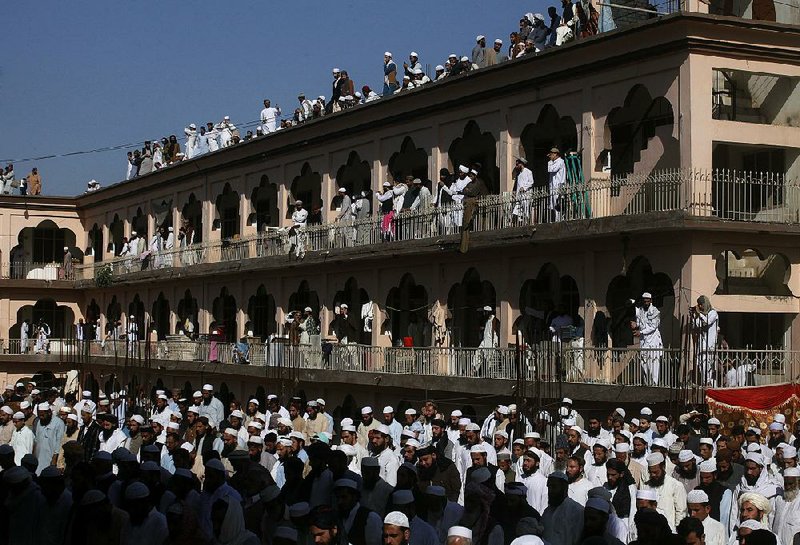AKORA KHATTAK, Pakistan -- Several thousand people gathered Saturday near the Afghan border to mourn the death of Maulana Samiul Haq, 82, a leading Sunni cleric and "father of the Taliban" who was stabbed to death by unknown assailants.
Officials and religious leaders from across the ideological spectrum in Pakistan and Afghanistan joined students from the renowned seminary in Akora Khattak where Haq taught and mentored two generations of Afghan Islamist fighters.
A delegation of Afghan leaders arrived to pay their respects to Haq, whom the Kabul government had recently asked to help persuade Taliban insurgent leaders to begin negotiations for an end to the 17-year war.
Haq's mysterious slaying Friday was a shock to the nation, taking place during several days of nationwide violent protests by traditionally moderate Sunni groups in Pakistan enraged by the Supreme Court's acquittal of a Christian woman convicted of blasphemy.
The packed funeral was a momentary pause in the nation's divisive turmoil as well as a tribute to Haq's multifaceted influence on the country.
He was a radical Islamist scholar -- often called by the title of respect, maulana. But he was also a respected political leader and legislator, and a humanitarian who famously issued a religious fatwa condemning Islamist militants for attacking health workers distributing the polio vaccine.
In the capital, Islamabad, and other cities, calm returned Saturday after anti-blasphemy groups called off four days of street protests. Their leaders professed to be nonviolent lovers of the Prophet Muhammad, but they exhorted angry crowds to block highways, set fires and throw stones. Some called for a military mutiny and the deaths of the justices who on Wednesday overturned the blasphemy conviction of Asia Bibi after she spent nine years in prison.
The Pakistani government conceded to most of the protesters' demands after hours of negotiations Friday night.
The signed deal, made public immediately, allowed the anti-blasphemy groups to appeal the Supreme Court ruling. It also agreed that Bibi, whom the protesters want dead, will not be allowed to leave the country.
While many Pakistanis expressed relief that relative calm had returned after days of unrest, the capitulation drew widespread condemnation Saturday. Many critics called it a dangerous surrender to the forces of religious extremism and hatred against minorities, who are often targeted on trumped-up charges of blasphemy against Islam.
Bibi, 47, a peasant worker, was convicted after an argument with Muslim co-workers in a field. The high court ruled that the evidence against her was flimsy and contradictory, but it did not criticize or question the strict blasphemy laws or the mandatory death sentence for those convicted.
Some warned that Bibi's life is not safe in Pakistan, where people accused of blasphemy are often lynched.
James Masih, Bibi's brother, said her lawyer, Saiful Malook, fled Pakistan Saturday.
Malook told The Associated Press last week that he would have to leave Pakistan because the followers of hard-line cleric Khadim Hussain Rizvi had threatened to kill him as well as the judges who acquitted Bibi.
Information for this article was contributed by staff members of The Associated Press.
A Section on 11/04/2018
